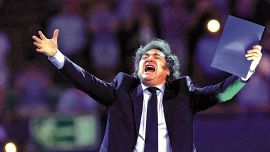Once upon a time, ambitious politicianscould afford to hide in the shadows andkeep their mouths shut for weeks onend. Far from harming them, beingmysterious could be an asset. Today,things are different. Thanks to the proliferationof electronic devices, politicians have to be extremely careful. They cannot let their mask slip for a single moment because they know that their every move, facial expression and casualcomment may be broadcast immediately to an audience ofmillions of often hostile onlookers or eavesdroppers,who will then make the most of whatever comes to their attention. An inopportune smirk, a word prone to be misunderstood,dozing off when something consideredimportant is going on… it may be enough toruin a promising career.
Mauricio Macri is constantly under fire not just for his government’s policies but because of what his milder critics say is his inability to “communicate.” As far as they are concerned, the president has a tin ear, an affliction that prevents him from ingratiating himself with the many whose political views depend on their imaginary personal relationships with the people who are jockeying for position at the top. When elections are approaching, largely subjective factors such as a politician’s image tend to matter far more than mere facts. In the hands of an unlikeable candidate, the best economic or social programme ever devised would be worse than useless, worse because his or her public reputation would be more than enough to discredit it.
Until fairly recently, politicians in parliamentary systems had to rely on rather more than their personal charm, but when canny operators like Tony Blair realised that an appealing image could make the difference between electoral success and failure for their party, they became increasingly presidential. In Europe, the fortunes of leaders such as Theresa May and Angela Merkel depend less on what they do than on their respective images. Much the same has happened in France where a hybrid system operates; after persuading voters he was the man to make his country great again or, at the very least, to prevent Marine Le Pen from installing herself in the Élysée Palace, President Emmanuel Macron fathered a brand-new party which promptly won a big majority in the elections last June.
These days, senior politicians simply have to be consummate actors who make out they share other people’s pain, shed tears when circumstances appear to call for it, and hug tramps if – as is now bound to be the case – someone with a camera is within range. In some parts of the world, those who aspire to high office must give the impression that they are every bit as touchy-feely as the weepiest do-gooder.
Qualities that were once respected, such as a clear view of what would have to be done to overcome deep-rooted problems or the courage to propose tough measures instead of letting things slide, may be appreciated by old-fashioned folk, but if they could be electorally costly, anyone of a crotchety disposition, as such people frequently are, who possesses them will be kept well in the background. The rise of the image-makers has had a deleterious effect on public policy in all democratic countries by making myopia virtually mandatory.
Most have no real leaders, their place having been taken by individuals who try to obey the dictates of opinion polls or focus groups until these begin telling them their predecessors got it all wrong. By nature, they are followers, but on occasion they go down a path that takes them up a dead-end. In much of Europe, the political elites are under attack because they stuck to policies, especially those involving large-scale immigration from underdeveloped and undemocratic parts of the world, that several years ago seemed uncontroversial but are now having unpleasant consequences. They are also paying a heavy price for their refusal to understand the implications of the demographic implosion that is depopulating large tracts of southern and eastern Europe and before too long will wreck almost all their pension arrangements.
The challenges confronting modern societies are too big, and too difficult, to be left in the hands of people who owe their prominence to their ability to act. As we in Argentina know better than most, popularity, competence and farsightedness do not always go together. For representative democracy to work, it has to throw up leaderships that achieve a balance between them. For a while, parliamentary systems, with several tiers of decision-making, appeared to have the key to that particular conundrum, but then they too succumbed to the presidential virus that has caused so much trouble not just in Latin America but also, with the election of a man more interested in his own image than in addressing problems that are attributable to an ominous combination of headlong technological change, divisive “identity politics” and fear of what the onrushing future could bring, the United States.
* Former editor of the Buenos Aires Herald. (1979-1986)




















Comments